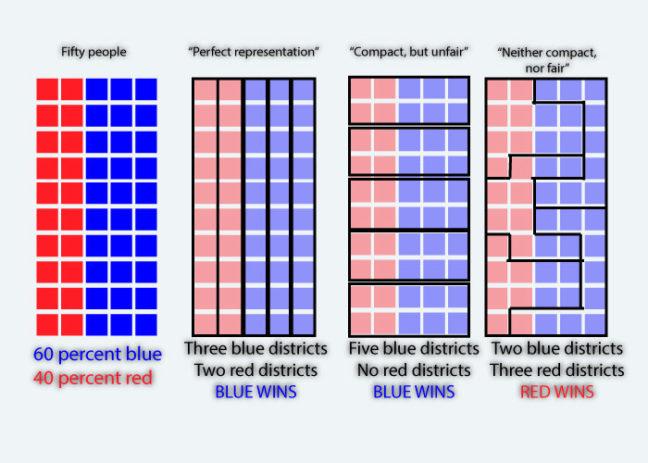Out of all the political ills that need treatment, few require more urgency than redistricting. Redistricting — the process in which congressional or state districts are drawn — at its core tries to evenly disperse and distribute districts based on census population data.
But like many things, once things get political, what something ought to be is lost completely. Instead, what has arisen is gerrymandering, or the deliberate redrawing of districts to favor a certain party.
For years, people have tried to argue against gerrymandering, pointing to its unfairness. But the Supreme Court has largely argued that constitutional law states that districts must be evenly distributed by population, but not by class, political ideology or any other distinction.
Essentially what this means is that those in power who wish to undermine democracy can carve out maps that result in their best-case scenarios.
Gerrymandering is not completely partisan — certainly, both sides, whether they say so or not, want to draw maps that will be help them govern, and will help them to have a better chance of staying in power. But overwhelmingly, Republicans in recent years are to blame for wildly drawn districts in their favor. As one Princeton study found, the myth of “both-sides” of gerrymandering is just that, a myth.
Evers plans to address gerrymandering, juvenile prisons in budget proposal
In Wisconsin, Republicans have gerrymandered a perfect storm — a set of districts which mean no matter a vote, no matter statewide outcomes, state Republicans will maintain hegemony and a mandate for power.
Take the 2018 midterm elections for example. Gov. Tony Evers won by about 1 percentage point, which would lead to an assumption that the state assembly elections would be relatively similar in their breakdown.
Unfortunately, this is not the case.
Democrats won every statewide and national election across Wisconsin, and outperformed Republicans in assembly elections by a greater margin than in the gubernatorial election, with Democrats winning 54 percent of the vote, and yet Democrats came away with only 36 out of 99 assembly seats. In other words, the Republican Party of Wisconsin, in votes, lost across the board, and yet maintained their assembly mandate.
Who’s to thank? Republican gerrymandering.
Evers’ efforts to remove state from ACA lawsuit is symbolic win for voters
It’s an infuriatingly disheartening problem. Wisconsin voters went to the polls and statistically rejected the Republican rule of law under Walker for 8 gruesome years only to find themselves still drastically in the minority in the assembly. That’s plain wrong.
In a recent effort to end this partisan gerrymandering, University of Wisconsin political science professor Barry Burden, alongside numerous professors in a range of disciplines across country, submitted an amicus brief to the Supreme Court of the United States. This cohort is right — gerrymandering must go, and it must go now before our already diluted democracy is completely destroyed.
It is beyond asinine that without winning a plurality, much less a majority of votes, one party or individual can go on to lead. This is an antithesis to the very idea of what democracy should be.
This argument similarly mirrors people’s complaints with the antiquated electoral college. How can one lose but still win? Something needs to be done, and that’s why pursuing fair redistricting is absolutely vital for anyone — regardless of political affiliation — who wants fairer and more democratic elections in this country.
One of the solutions Burden et al. argued for would be a series of hypothetical computer generated and modeled districts, that could be tested for partisan bias. By leveraging technology to create districts that are more randomly distributed, it would, hopefully, break down some of the bias bulwarks that Republicans have drawn up in recent years.
Another solution would be a constitutional amendment specifying how districts should be drawn and outlawing partisan gerrymandering altogether. This isn’t necessarily politically plausible with the current Congress, but it is something that’s just as important as any federal discussion, even if it doesn’t sound as sexy.
Article 1, Section 4 of the U.S. Constitution affirms that states and their legislatures have the power to draw up lines and control their own elections. While this was a tenet of federalism when it was implemented, it means that if a party in power has enough of a mandate, they can legally draw the lines to their districts.
Similarly, the Wisconsin Constitution simply says that districts must be continuous, and aim to focus one area when possible — the constitution also gives the power to the state legislature with allotting the governor the power of the veto.
This means that the control of both of the legislature and Governorship could completely alter the state of democracy in our state, which is exactly what happened during the Walker administration.
But reversing this could be done by revolutionary, forward-thinking federal movements that revolve around enhancing voting across the country. Though a bold idea, this would absolutely lead to more competitive elections across the state and the country — a stance everyone, regardless of their political beliefs should get behind.
Adam Ramer ([email protected]) is a senior majoring in political science and history.




















